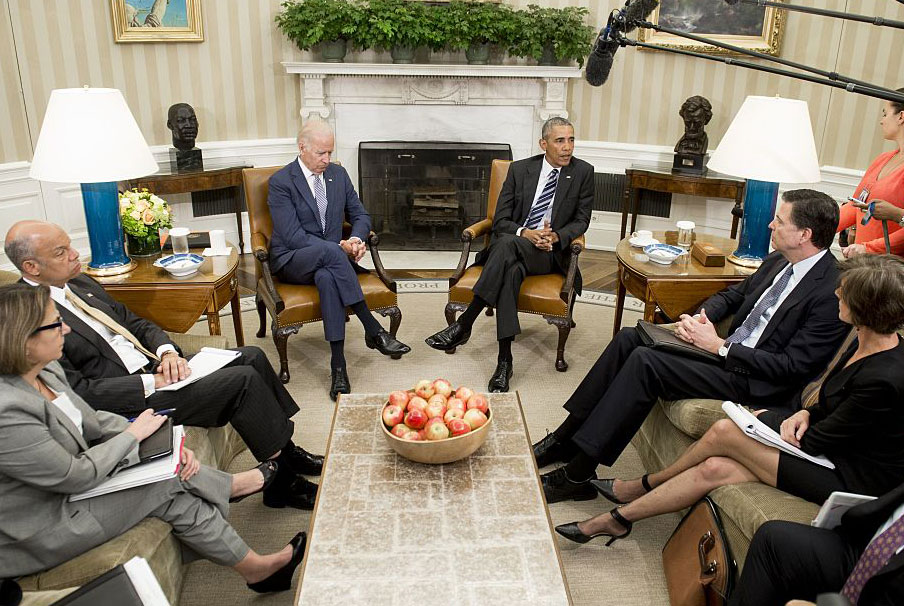The two presumptive presidential nominees have reacted to the massacre in Orlando—the deadliest shooting in US history—in predictable ways: Donald Trump was narcissistic and hateful, and Hillary Clinton was reasonable and resolved. Their responses define the borders of the public conversation about attacks such as this, and these borders are off. This is the conversation about terrorism that America has been having for nearly fifteen years, and it is the wrong conversation because it confuses cause and effect and, consequently, proposes the wrong solutions.
In her statement on Orlando, Clinton listed “defeating international terror groups” as the first line of response (the second paragraph of her statement addressed homophobia and the third, the need for gun control). Trump’s remarks should not be dignified with a quote, but he immediately blamed the attack on “radical Islamic terrorism”—and on immigration from the Middle East, which he wants to ban. (The attacker was born in New York.) Bernie Sanders focused on ISIS, too: “That despicable and barbaric organization must be destroyed,” he Tweeted. Even President Obama, in a speech that emphasized “how easy it is for someone to get their hands on a weapon that lets them shoot people,” made clear that he would “spare no effort to determine what…inspiration or association this killer may have had with terrorist groups.” Later on Monday he said, “We have to go after these terrorist organizations and hit them hard.”
The trouble is, as with previous recent attacks on American soil, little of what we know about the massacre so far suggests that an international terror organization had much to do with it. As with the attackers in Boston in 2013 and in San Bernardino in 2015, the attacker in Orlando was a self-declared member of an international jihadist group. Yet in each of these cases, there is no evidence that the organizations were even aware of the attackers before they acted. In other words, these affiliations were imagined by the attackers themselves.
We have made up categories to explain this kind of connection: “self-radicalization” and “lone-wolf terrorism.” These terms imply a greater difference than actually exists between these terrorists and the perpetrators of the September 11 attacks. The 9/11 terrorists started out as freelancers, bringing their ideas to al-Qaeda. Their desire to act preceded their affiliations.
Is declaring war on the larger organization, then, a good strategy? Is there any reason to assume that attackers in search of a back story will not find another organization to lend them the imagined legitimacy that they seek? That all such organizations can be destroyed? That a new one cannot be created out of thin air? No.
Worse, the declaration of war that invariably follows every act of terrorism is exactly what the perpetrators seek. The message of the terrorist is, “I matter. My cause matters. My hatred matters. My ability to act matters.” We respond by saying, “Yes, you matter.” We imbue the terrorist with awesome power: he becomes an individual suddenly capable of declaring war on an entire nation or nations—and having the declaration accepted. Last year, most of the leaders of the free world marched in formation through the streets of Paris in response to a terrorist attack. Imagine one day looking, to all the world, like a loser, and probably feeling like one—and the next day, making prime ministers link hands, or presidential candidates declare resolve. A shocking tragedy like Orlando, of course, requires the president and presidential candidates to respond, and responding with war rhetoric fits the general fighting spirit of any campaign. Still, it is the wrong response.
We do not glorify other violent criminals this way. Even with school shootings, while the media grow understandably obsessed with the person of the attacker, the national response is one of overwhelming grief, not mobilization. We have cultural mechanisms for acknowledging the senselessness of tragedy. After Newtown, for example, President Obama led the nation in mourning. He cried in public when he spoke about the deaths of children. By contrast, when Obama made his statements on the Boston Marathon bombing, he projected steely resolve, even when he mentioned the death of an eight-year-old child. His statement on the school stressed profound loss, whereas his statement on the bombing aimed at an illusory victory over terrorism. Grieving may make us feel even more powerless—a feeling that the declarations of war temporarily alleviate—but it avoids the trap of mirroring the meaning and grandeur that the terrorist himself wants to project. It also has the benefit of being true: the victims in Orlando did not die for a cause, their own or Omar Mateen’s.
Terrorist attacks are unconscionably frightening—that is the point. We long to believe that something as enormous as our fear stands behind the attacks. ISIS fits that need, as, earlier, did al-Qaeda. We listen to the stories the terrorists tell about themselves, and we mirror them back. We envision giant international groups, well-armed and well-organized, waging well-planned war in which the individual terrorists are soldiers. The vision seems perfectly to match the image ISIS wants to put forward: that of a group with vast reach, capable of wreaking havoc on streets the world over and influencing the course of American politics. But the attacks themselves don’t quite fit this story.
Advertisement
Vowing to fight international terrorism will not prevent future attacks. Even actually destroying ISIS would not prevent them. Banning assault weapons would not prevent future attacks either, but it would probably help reduce the number of potential casualties by making the killing less efficient. Changing the terms of the public conversation is not a solution either. But if we focused on what we know rather than what we imagine—on loss rather than victory—and if we focused on what we feel rather than what we want—grief rather than revenge—it would be a step toward a less grand vision of violence. It would also be more emotionally honest and factually true.



